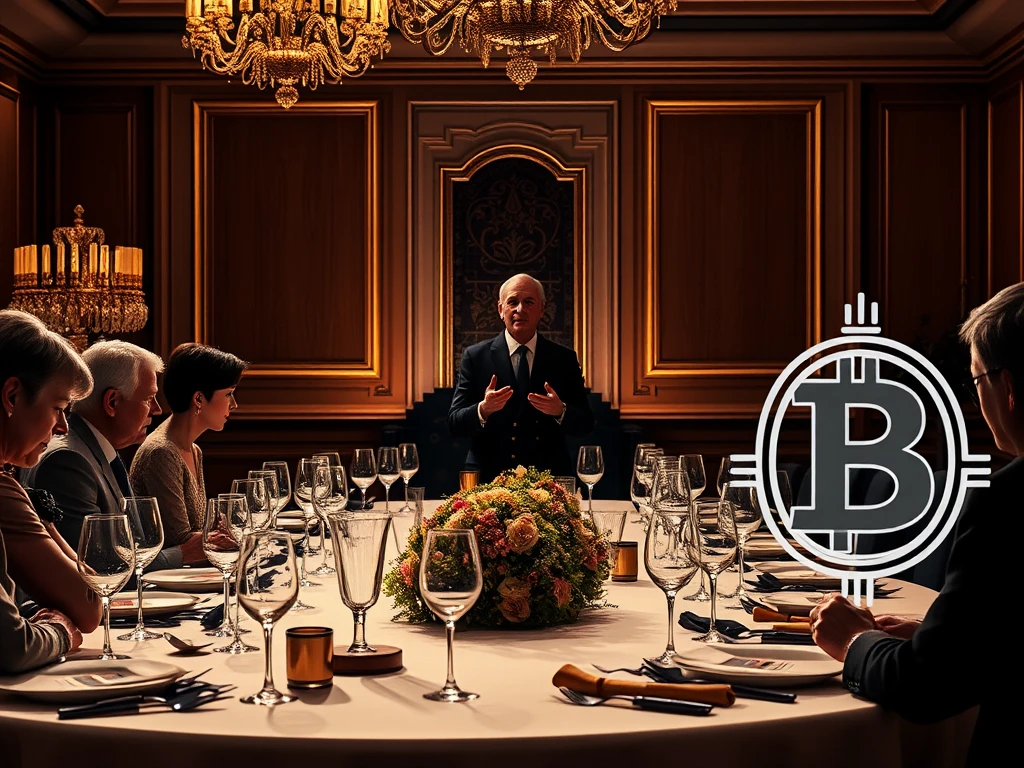Trump Memecoin Dinner Sparks Fierce Crypto Legislation Debate

The upcoming Trump memecoin dinner is generating significant buzz and controversy within the crypto community and political circles. Scheduled for May 22nd in Washington, DC, the event is set to host individuals who purchased large amounts of the TRUMP memecoin. This gathering highlights the growing intersection of cryptocurrency and politics, but also raises important questions about influence and transparency.
What is the Memecoin Dinner?
The event is reportedly a private dinner and reception for up to 220 individuals identified as holding significant quantities of the TRUMP memecoin. This unique approach links direct financial support for a specific crypto asset to potential access to a former US President. While the exact guest list remains private, reports suggest a diverse group of attendees, including some foreign nationals.
Who is Attending the Memecoin Dinner?
Attendees reportedly qualified by being among the top 220 holders of the TRUMP token by a specific date. Potential attendees mentioned include figures from the crypto space and finance:
- Synthetix founder Kain Warwick
- Consultant Vincent Deriu
- Crypto user Morten Christensen
- Financial adviser “Ogle”
- A representative from Singapore-based MemeCore
- Vincent Liu, Chief Investment Officer at Kronos Research
One potential attendee noted their TRUMP purchase was driven by market factors, not political alignment. The top holders collectively spent a substantial amount to gain the opportunity to attend.
Examining the Conflict of Interest Concerns
A major point of contention surrounding the event is the potential for a conflict of interest. Critics, including members of Congress, argue that allowing individuals who have financially benefited from or invested heavily in a specific asset tied to the president to gain access raises transparency issues. Concerns are amplified by reports that some top holders may be foreign nationals, potentially linking foreign money directly to access or influence regarding a US political figure.
As Rebecca Liao, co-founder and CEO of Saga, pointed out, the Trump family’s public involvement and investment in crypto ventures create a perception problem. Policy shifts favoring crypto could be viewed through the lens of self-enrichment rather than national interest.
How Does Donald Trump Crypto Involvement Impact Legislation?
The controversy has already spilled into the legislative arena, directly impacting discussions around key crypto bills. Democrats have voiced reluctance to support proposed digital asset legislation, such as stablecoin frameworks and market structure bills, until concerns about what they term “Trump’s crypto corruption” are addressed.
The situation illustrates how the former president’s direct link to a specific crypto asset complicates bipartisan efforts on crypto regulation. What might have been a straightforward legislative path is now entangled in political disputes. House Speaker Mike Johnson downplayed concerns, while the White House deputy press secretary reportedly stated there were no conflicts because Trump’s assets are managed via a trust. However, critics remain unconvinced.
The Broader Implications for Crypto Legislation
The debate around the Trump memecoin dinner highlights the challenges facing crypto legislation in the US. The political polarization surrounding Donald Trump crypto activities adds complexity to an already difficult process of creating clear regulatory frameworks. The upcoming vote on the GENIUS Act, a stablecoin bill, is seen by some as an early test of how lawmakers will navigate these new political dimensions of the crypto industry.
Companies are also navigating this landscape. Freight Technologies announced a $20 million investment in the TRUMP token, citing potential impacts on trade policy. GD Culture Group included the memecoin in its crypto reserve plans. These examples show businesses considering the political angle when dealing with crypto assets linked to political figures.
In conclusion, the memecoin dinner is more than just a social event; it’s a focal point for debates about ethics, transparency, and the future of crypto legislation in the United States. The political entanglements surrounding Donald Trump crypto ventures are creating hurdles for regulatory progress and raising significant questions about the influence of wealth in politics.








